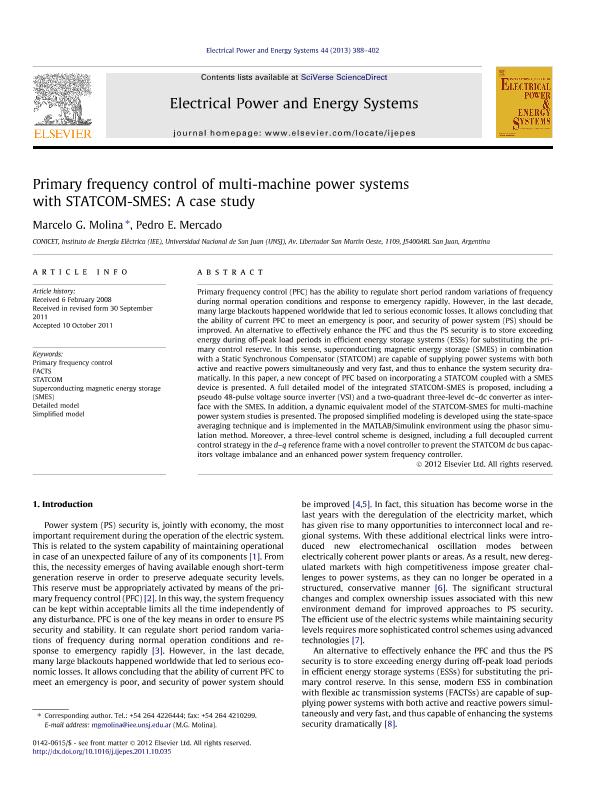Mostrar el registro sencillo del ítem
dc.contributor.author
Molina, Marcelo Gustavo

dc.contributor.author
Mercado, Pedro Enrique

dc.date.available
2017-07-18T21:29:26Z
dc.date.issued
2013-01
dc.identifier.citation
Molina, Marcelo Gustavo; Mercado, Pedro Enrique; Primary Frequency Control of Multi-Machine Power Systems with STATCOM-SMES: A Case Study; Elsevier; International Journal of Electrical Power & Energy Systems; 44; 1; 1-2013; 388-402
dc.identifier.issn
0142-0615
dc.identifier.uri
http://hdl.handle.net/11336/20894
dc.description.abstract
Primary frequency control (PFC) has the ability to regulate short period random variations of frequency during normal operation conditions and response to emergency rapidly. However, in the last decade, many large blackouts happened worldwide that led to serious economic losses. It allows concluding that the ability of current PFC to meet an emergency is poor, and security of power system (PS) should be improved. An alternative to effectively enhance the PFC and thus the PS security is to store exceeding energy during off-peak load periods in efficient energy storage systems (ESSs) for substituting the primary control reserve. In this sense, superconducting magnetic energy storage (SMES) in combination with a Static Synchronous Compensator (STATCOM) are capable of supplying power systems with both active and reactive powers simultaneously and very fast, and thus to enhance the system security dramatically. In this paper, a new concept of PFC based on incorporating a STATCOM coupled with a SMES device is presented. A full detailed model of the integrated STATCOM-SMES is proposed, including a pseudo 48-pulse voltage source inverter (VSI) and a two-quadrant three-level dc–dc converter as interface with the SMES. In addition, a dynamic equivalent model of the STATCOM-SMES for multi-machine power system studies is presented. The proposed simplified modeling is developed using the state-space averaging technique and is implemented in the MATLAB/Simulink environment using the phasor simulation method. Moreover, a three-level control scheme is designed, including a full decoupled current control strategy in the d–q reference frame with a novel controller to prevent the STATCOM dc bus capacitors voltage imbalance and an enhanced power system frequency controller.
dc.format
application/pdf
dc.language.iso
eng
dc.publisher
Elsevier

dc.rights
info:eu-repo/semantics/openAccess
dc.rights.uri
https://creativecommons.org/licenses/by-nc-sa/2.5/ar/
dc.subject
Detailed Model
dc.subject
Facts
dc.subject
Primary Frequency Control
dc.subject
Simplified Model
dc.subject
Statcom
dc.subject
Superconducting Magnetic Energy Storage (Smes)
dc.subject.classification
Ingeniería Eléctrica y Electrónica

dc.subject.classification
Ingeniería Eléctrica, Ingeniería Electrónica e Ingeniería de la Información

dc.subject.classification
INGENIERÍAS Y TECNOLOGÍAS

dc.title
Primary Frequency Control of Multi-Machine Power Systems with STATCOM-SMES: A Case Study
dc.type
info:eu-repo/semantics/article
dc.type
info:ar-repo/semantics/artículo
dc.type
info:eu-repo/semantics/publishedVersion
dc.date.updated
2017-07-18T20:06:41Z
dc.journal.volume
44
dc.journal.number
1
dc.journal.pagination
388-402
dc.journal.pais
Países Bajos

dc.journal.ciudad
Ámsterdam
dc.description.fil
Fil: Molina, Marcelo Gustavo. Consejo Nacional de Investigaciones Científicas y Técnicas. Centro Científico Tecnológico Conicet - San Juan. Instituto de Energia Eléctrica. Universidad Nacional de San Juan. Facultad de Ingeniería. Instituto de Energia Eléctrica; Argentina
dc.description.fil
Fil: Mercado, Pedro Enrique. Consejo Nacional de Investigaciones Científicas y Técnicas. Centro Científico Tecnológico Conicet - San Juan. Instituto de Energia Eléctrica. Universidad Nacional de San Juan. Facultad de Ingeniería. Instituto de Energia Eléctrica; Argentina
dc.journal.title
International Journal of Electrical Power & Energy Systems

dc.relation.alternativeid
info:eu-repo/semantics/altIdentifier/url/http://www.sciencedirect.com/science/article/pii/S0142061512004267
dc.relation.alternativeid
info:eu-repo/semantics/altIdentifier/doi/http://dx.doi.org/10.1016/j.ijepes.2011.10.035
Archivos asociados
